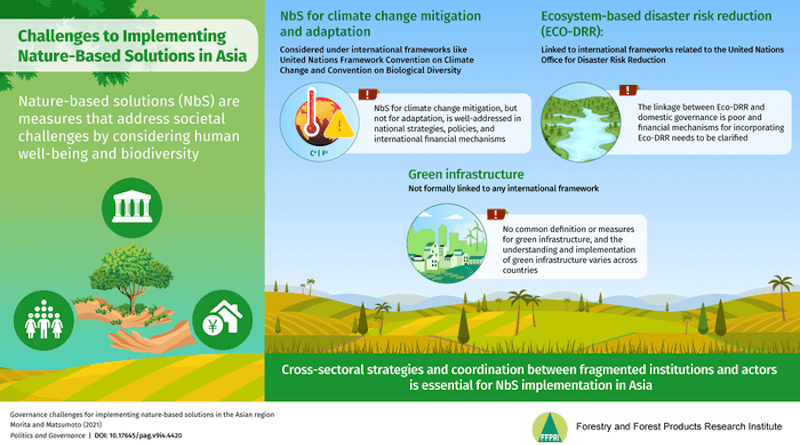National And International Frameworks Are Imperative For Implementing Nature-Based Solutions In Asia
Recognized by the United Nations Framework Convention on Climate Change (UNFCCC) and the Convention on Biological Diversity (CBD), nature-based solutions (NbS) refer to solutions that bring together human well-being, environmental sustainability, and biodiversity benefits. NbS are also key elements to post-COVID-19 pandemic recovery strategies. NbS include a variety of elements, starting from ecosystem-based climate change mitigation to ecosystem-based disaster risk reduction measures. While the techniques behind NbS may not be new, incorporating them into national and international governance frameworks for their effective implementation is.
Most studies on NbS focus on Europe. The European Union was an early adopter of NbS and has ensured its promotion by linking NbS with the European Green Deal and COVID-19 pandemic recovery. The region has firmly established links between NbS and various actors (governments, institutions, businesses, etc.). But the same cannot be said of Asia. There remains a lack of cohesive regional strategy for implementing NbS in Asia, as well as limited cross-sectoral local and national governance to promote NbS and green recovery strategies. The large number of developing countries in Asia also presents a problem for the promotion and realization of NbS.
In a new study, published in Politics and Governance, researchers Dr. Kanako Morita from the Forestry and Forest Products Research Institute and Associate Professor Ken’ichi Matsumoto of Toyo University, Japan, have elaborated the governance challenges to implementing NbS in East, Southeast, and South Asian regions. “Implementing NbS governance in countries at different stages of economic development is tricky, as is developing measures for NbS with different institutions and actors,” explains Dr. Morita.
The findings of their study indicated that climate change mitigation, disaster risk reduction (DRR), and infrastructure are three areas where NbS have been widely implemented in Asian countries. These areas are also linked to climate security issues, including ecological security. However, there is scope for further work, particularly to ensure uniformity in implementing NbS across diverse regions. “Current discussions on NbS governance focus on urban areas, but NbS are essential across a wide range of landscapes and seascapes and across jurisdictional boundaries. In developing countries particularly, there is a need for international cooperation in NbS governance,” observes Dr. Morita, in this context.
The researchers found that NbS have links to international frameworks related to the UNFCCC and CBD in the area of climate change (climate change mitigation), with clear national strategies, policies, and international financial mechanisms. The Paris Agreement is one of the main drivers behind this development. Unfortunately, however, discussion on cross-sectoral strategies, such as application of NbS to post-pandemic green recovery, has not been extensive in Asian countries so far.
In the field of DRR, NbS are linked to the United Nations Office for Disaster Risk Reduction (UNDRR). Japan in particular is heavily invested in the promotion of ecosystem-based DRR (Eco-DRR). But the same cannot be said about other Asian countries. While some countries have incorporated Eco-DRR in their national strategies, the domestic governance and measures for implementation remain poor. The financial mechanisms for incorporating NbS in Eco-DRR need to be elaborated and clarified. Moreover, developing countries in particular need both financial and technical support to properly implement NbS for Eco-DRR.
Finally, the researchers found no official links between NbS and international frameworks in the infrastructure field. “There is no consensus on what NbS for infrastructure entails. This makes it very difficult to establish national policies or frameworks, and, more importantly, financial mechanisms for the implementation of NbS,” says Dr. Morita.
Taken together, the study highlights the fragmentation of institutions and actors in Asia, and the unique challenges this poses for the different types of NbS. The study also emphasizes the need for cooperation among local, national, and international actors including governments, and institutions. “Our analysis recognizes the need for a cross-sectoral framework to match the need for NbS with relevant actors and institutions at various scales. We also recommend creating guidelines to incorporate and promote NbS into local and national policy, as well as international cooperation,” concludes Dr. Morita.
Implementing these suggestions will surely help address the tragedy of the commons staring us all in the face¬—that is climate change—as well as achieve benefits for biodiversity and humans, both in the short-term, post pandemic, and with regards to long-term sustainable development.

